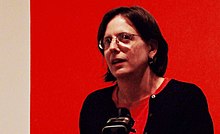Judith Berman(born 1958[1]) is an American anthropologist and science fiction and fantasy writer.
Judith Berman | |
|---|---|
 Berman in 2008 | |
| Born | 1958 (age 65–66) |
| Occupation |
|
| Nationality | American |
| Education | Bennington College University of Pennsylvania(PhD) |
| Genres | |
| Spouse | John Holland |
| Children | 1 |
Biography
editBerman grew up inMoscow, Idaho,and read works fromGolden Age science fictionduring her childhood.[2]She began writing and making up her own stories around the age of five or six.[3]
She graduated fromBennington Collegein 1979, where she majored in Anthropology, Russian, and comparative literature.[3]
After working as an editorial assistant atW.W. Norton,she received her Ph.D. in anthropology from theUniversity of Pennsylvaniain 1991.[3]As of 2013 she lives inVictoria, British Columbiawith her husband John Holland and their son Sam, born 1999.[3]
Berman has a form ofsynesthesia.[4]
Fiction
editBerman's fiction was short listed for the Nebula, the Sturgeon, and Crawford awards. She won a best critical length essay of its yearSFRA Pioneer Award[5]from the Science and Fiction Research Association for her 2001 essay, “Science Fiction Without the Future” Her short fiction appeared in Asimov’s, Interzone, Realms of Fantasy, and Black Gate.[2]
Her science fiction and fantasy occasionally draws on her anthropological background, including her first novel,Bear Daughter(2005), nominated for the Crawford Award. Although about fictional characters,Bear Daughteris inspired by Native American stories and the indigenous traditions of the north Pacific coast. Berman wanted to be as true as possible to worldviews that were contained in the indigenous sources even though the story is fundamentally about her own personal concerns.[2]In her acknowledgments, she thanks various cultures in their own language for their contribution: Gunalchéesh (Tlingit), Hàw’aa (Haida), T'ooyaksiy nisim (Nisga), T'ooyaxsiy nisim, N t'oyaxsasm, Analhzaqwnugwutla, Giáxsia, Gianakasi, Stutwinii (Nuxalk Nation), Gelakas’la (Gwa'sala people), and Tl'eekoo (Huu-ay-aht First Nations).
Linguistic anthropology
editBerman is trained as alinguistic anthropologistwho published articles aboutNative American mythand translations, in particular those of the Pacific Northwest.[2]She specializes in oral literature, ethnohistory, and history or ethnographic research on the Northwest Coast, focusing on the lives and work of indigenous ethnographersGeorge HuntandLouis Shotridge.[6]
She was a research associate at theUniversity of Pennsylvania Museum of Archaeology and Anthropologyin 2005.[3]She was adjuncts in the University of Victoria School of Environmental Studies anthropology department (2013–2016), with research interests in Northwest Coast oral literature and ethnohistory and is aFranz Boasscholar.[6]
Berman discussescultural appropriationin her interview withStrange Horizons.[7]
Works
editFiction
edit- “The Year of Storms” (1995)
- “Lord Stink” (1997)
- “The Window” (1999) (third place Sturgeon winner)
- “Dream of Rain” (2000)
- “Lord Stink and Other Stories” (chapterbook, appeared fromSmall Beer Pressin 2002)[3]
- “The Fear Gun” (2004) (2005 Sturgeon finalist)
- “The Poison Well” (2004)
- Bear Daughter(2005)
- "Awakening" (2008) (nominated for a Nebula Award for Best Novella)[8]
Non-fiction
editReferences
edit- ^Date information sourced from Library of Congress Authorities data, via correspondingWorldCatIdentitieslinked authority file (LAF).
- ^abcdBerman, Judith."Science Fiction Without the Future".Strange Horizons.Archived fromthe originalon 6 March 2016.Retrieved17 February2016.
- ^abcdef"Judith Berman: Zombies and Spaceships".Locus.August 2005.
- ^Interview at Strange HorizonsArchived2008-03-24 at theWayback Machine
- ^"Science Fiction Research Association - Home".sfra.org.
- ^ab"Franz Boas Papers: Documentary Edition".Western University: Social Science.
- ^"Interview: Judith Berman".2005-09-26. Archived fromthe originalon 2008-03-24.Retrieved2023-02-05.
- ^Locus Index to SF AwardsArchived2007-09-02 at theWayback Machine
- ^Berman, Judith.Topics in the Clausal Syntax of German.Studies in Constraint-Based Lexicalism. Center for the Study of Language and Information.
- ^Stocking, George W. (1996-07-01).Volksgeist as Method and Ethic: Essays on Boasian Ethnography and the German Anthropological Tradition.Univ of Wisconsin Press.ISBN978-0-299-14553-8.